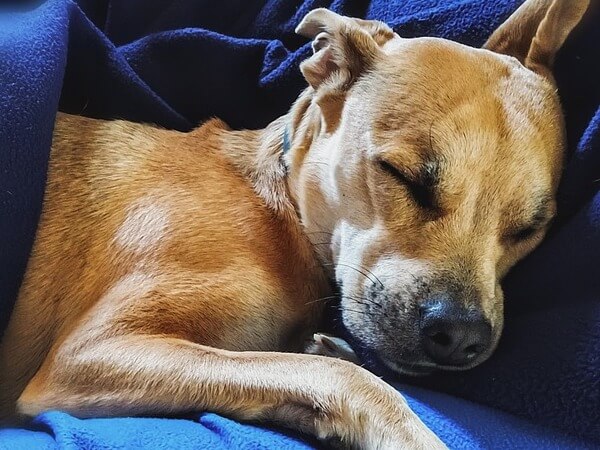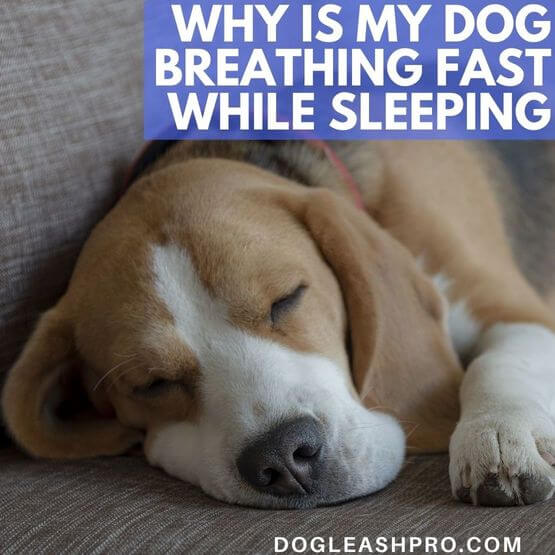

Why is my dog breathing fast while sleeping? If your dog is breathing fast while sleeping, it is usually nothing to worry about as your pup may be having exciting dreams. However, it’s important to find out what is causing this behavior. Consider her age, size, and if it’s only happening during her sleep. If not, speak with your vet as it could be a sign of other health problems.
What is more adorable than a peacefully sleeping dog? After a long day of playing, running, and being precious, any dog would need his rest. With all that fatigue at the end of the day, we all want our dogs to have the quietest refreshing sleep ever. However, this is not always the case.
Sometimes, about 20 minutes into a nap you will see your dog start to get seemingly restless in their sleep. Whether you have a dog or a puppy breathing fast while sleeping, you have every right to be concerned. If this worries you, don’t fret. You are not alone. Many dog owners are also concerned about this same issue.
In this comprehensive guide, we will find out what is causing your dog to breathe fast while sleeping and when to worry and visit the vet. You may be immediately alarmed but we’ll discuss normal and abnormal breathing rates in dogs and what you can do.
Table of Contents
Why is my dog breathing fast while sleeping?

Dogs like humans have two states of sleep; REM and Non-REM states. Fast breathing is usually a sign that a dog is in the REM state of sleep.
On average, dogs take about 20 minutes to reach the REM phase of sleep. REM or rapid eye movement is when your pup enters deep sleep. During REM sleep, it is normal for dogs to have short and fast breaths through their noses.
The VCA Hospitals website states that during REM sleep or deep sleep, your dog will have rapid eye movements and their brain waves will be faster and irregular. While their muscles are more relaxed, their mind is more active and their eyes are moving fast beneath their eyelids.
In this stage, you may notice your dog begin to breathe faster, kick, toss around, or even bark softly.
Overall, it’s perfectly normal for dogs to have increased heart rates, breathing rates, and temperature during REM sleep and these reasons are what cause faster breathing in healthy sleeping dogs.
Is my dog dreaming or having a seizure?
The signs of a dream and a seizure while sleeping can look similar. It is therefore normal for you to be confused by the two. If you think your dog is having a seizure, check out for these signs to confirm:
- The head will be pulled back.
- The dog’s legs will become stiff.
- Your dog may be drooling excessively after waking up.
- The dog may urinate or defecate involuntarily during sleep.
Don’t miss: My Dog Snores And Sounds Congested (10 Reasons & How To Help)
Is it bad if my dog breathes fast while sleeping?
If your dog is healthy, breathing fast while sleeping should not worry you. Watch your dog when she wakes up. If her behavior remains normal during waking hours, there is most likely nothing to worry about. However, if the dog is slower, less active, or generally different than usual, it is best to see a vet.
Puppies and older dogs are more likely to breathe fast while sleeping

Puppies and older dogs are more likely to breathe fast than their middle-aged counterparts. Puppies generally have faster heart rate and a high metabolism which requires a higher respiratory rate hence faster breaths – even when they are asleep.
Senior dogs may have reduced lung capacity requiring them to make faster breaths to keep up with the oxygen demand of the body.
For these reasons, faster breathing in puppies and senior dogs should be less of a worry than in a healthy middle-aged dog. However, there are some situations that may indicate a health issue.
As a dog owner, find out how long the heavy or fast breathing lasts. If your canine is breathing fast while asleep for just a few minutes, then it is normal and nothing to worry about. But if this continues, you should see your dog’s vet immediately.
How do you know if your dog’s fast breathing is indicative of a health issue or from deep sleep? Keep reading to learn what veterinarians and professional experts say:
Dog breathing fast in sleep: When is this considered normal?
On average, the normal breathing rate for a healthy dog in a restful and sleeping state is within the range of 15 to 30 breaths per minute (view source). The figure can be higher or lower depending on your dog.
After approximately 20 minutes into a nap, your dog may enter REM sleep. At this time, you’ll notice the following reactions which may indicate that your dog has entered deep sleep.
- Fast breathing through their mouth or nose.
- Shallow or deep breathing.
- Whimpering, barking, or woofing.
- Twitching.
- Kicking.
- Stretching.
- Moving their paws like they are swimming.
If these reactions only last for a few minutes while they are in deep sleep and they behave normally when they’re awake, then there is nothing to worry about. Try not to touch or shake your pup while he is in deep sleep. They may be having a nightmare and may react by biting you.
When is it abnormal for dogs to breathe fast while sleeping?
If you consistently count more than 30 breaths per minute while your dog is sleeping, it is considered abnormal and there may be a cause for concern. See your dog’s vet right away.
How fast should my dog breathe while sleeping?

In the initial stage of sleeping, a dog should breathe at the normal breathing or sleeping rate. However, as sleep progresses, the breathing rate changes. Particularly, during REM sleep, the breathing rate increases.
If your dog’s breathing rate is over 30 breaths per minute, it is a good idea to schedule an appointment with your vet because this is considered abnormally rapid breathing. It may indicate that your dog may be suffering from a condition or disease.
When should I see a vet if my dog is breathing fast while sleeping?
While increased breathing rate in dogs is usually no cause for concern, it may sometimes be an indication of other health complications in dogs. In the following circumstances, it is highly advisable to see a vet:
- If there is a change in the dog’s behavior when she is awake, for example, if she plays less than usual.
- If your dog has a pre-existing condition or disease such as heart disease.
If you know your pooch has a history of respiratory distress, we highly recommend that you consult with your vet as soon as you can.
Signs of respiratory distress includes:
- Breathing very hard and loud (your pooch may use his abdomen muscle to help him breathe).
- Breathing using the mouth instead of the nose.
- Breathing sound is different from a normal panting sound.
- Gums are very red, pale, or pale blue.
- Unable to move.
- Unwilling to eat food or drink water.
- Drooling uncontrollably.
How will the vet properly diagnose the cause of my dog’s rapid breathing?
When you speak with your vet, she will advise you of whether or not to bring your pup in for a check-up. Your dog’s vet will perform both a physical check-up as well as several diagnostic tests.
The physical check up helps the vet determine the root cause of your pup’s breathing problem. It could be due to various reasons such as a problem in the lungs, circulatory system, heart, head, neck or airway. The vet will take a look at your dog’s overall health condition to see what is causing him to breathe fast.
If a diagnostic test is recommended by the vet, your furry friend may have an x-ray test. This test will allow the vet to see if your pooch has any problem in the lungs, heart, or abdomen. Sometimes, it could be broken ribs or tumors in the lungs that are causing your pup to have a difficult time breathing.
Why should I evaluate my dog’s breathing rate at home?
Checking your dog’s breathing rate at home can help detect potential illnesses early. It is especially important in dogs with chronic conditions and could be fatal in some cases.
Fast breathing through the nose could be an early sign that your dog may be developing heart issues. See your vet right away so you suspect there may be a problem so it doesn’t get worse.
What should I do if my dog’s breathing rate increases while sleeping?
If you observe your pup breathing faster, the first step is to measure his breathing rate to confirm your suspicion. If it is, observe your dog’s behavior when he’s awake to check for any changes. If there is no change in behavior, take another reading to see if the breathing rate is still high.
Make sure the increased breathing rate is consistent. Count the breathing rate at least three separate times over the next few hours the next time your pup is sleeping. If the increased breathing rate persists, contact your vet right away.
How can I provide a comfortable space for my dog to sleep?
There are plenty of ways to provide your dog a comfortable space to sleep. They include:
- A comfortable, elevated dog bed in a well-ventilated and dimly lit area.
- A regular sleep schedule; train your dog to sleep at regular hours. This will greatly improve the quality of sleep they get.
- Engage your dog in physical activity so they can tire out and sleep better.
- If all the above methods do not seem to work, consider medication but only after seeing your vet.
Clinical signs associated with heart disease or heart failure in dogs
Fast breathing of more than 30 breaths per minute when your dog is sleeping is a sign of heart disease in dogs. Other signs you can check for to determine if your dog is developing heart disease include:
- Weakness or lethargy.
- Vomiting.
- Reduced tolerance for physical exercise which can sometimes result in fainting after heavy exercise.
- Depressed or quiet.
- Breathing heavily or labored breathing.
- Arrhythmia or irregular heartbeat.
- Reduced appetite.
- Weight loss.
What are the signs of respiratory distress in a dog?
Increased breathing rate may also be due to a respiratory condition such as obstructive pulmonary disease. Other symptoms of respiratory distress include:
- Difficulty breathing.
- Coughing.
- Nasal discharge.
- Weakness or lethargy.
- Noisy breathing.
How to count my dog’s sleeping breathing rate?
Determining your dog’s breathing rate is not as complex as you would think. Breathing rate is defined as the number of breaths per minute. Therefore, to determine the breathing rate, all you have to do is count the number of breaths your dog takes per minute.
To measure your dog’s breathing rate, you will need to observe her chest movements. One breath is counted when the dog’s chest moves in and out. Set your clock to 30 seconds. Count the number of breaths. To find the number of breaths per minute, multiply that figure by 2.
Alternatively, you can set your clock to the full 60 seconds and count the total breaths per minute. In this case, you do not have to multiply the breaths by two. If possible, take readings at separate times so you can find the average number of breaths per minute.
To make this process easier, there are apps such as Cardalis that can help you measure and track your dog’s breathing rate.
Note that the resting or sleeping breathing rate tends to be in a similar range, however, the resting breathing rate may be higher than the sleeping rate. Resting breathing rate is also more reliable as an indicator of health since sleeping breathing rate can fluctuate as we have seen above.
How often should I count this breathing rate in my dog?
Your vet will typically have you count your dog’s breathing rate at least once every day for a whole week. This will help you become more comfortable with the process and both you and your vet will find out what your dog’s normal sleep breathing rate is.
9 Reasons Why A Dog Is Breathing Fast While Sleeping:

While it is normal for dogs to breathe fast during sleep, sometimes, it is indicative of a problem or condition. Some of the conditions that may cause an increased breathing rate for dogs during sleep include:
1. Heatstroke
When the weather is hot, dogs may breathe fast. A dog’s normal body temperature is 101 to 102.5℉ (or 38.3 to 39℃). If their body temperature increases to 104 – 105.5℉ (or 41.3 – 42℃), they may have heat stroke.
During a heat stroke, your dog will breathe fast and pant heavily through their mouths as a way to cool themselves down. Keep in mind that dogs don’t sweat like humans.
2. Onion and garlic poisoning
Both onion and garlic are harmful to dogs. They contain toxic substances such as sulfide compounds that cause red blood cells to burst. Damaged red blood cells can result in anemia in dogs. Anemia compromises the transport of oxygen so your dog has to breathe fast to compensate for this.
If you suspect onion or garlic poisoning in your dog, check for other signs and symptoms such as:
- Excess salivation
- Abdominal pain
- Vomiting
- Diarrhea
- Reddish urine
- Lethargy
- Increased heart rate
If you confirm poisoning, call the pet poison helpline or your vet immediately.
The signs and symptoms of onion and/or garlic poisoning may develop slowly so it is best to monitor progress over a couple of days if you suspect it occurred.
If your dog is more susceptible to onion or garlic poisoning, it is advisable to see a vet if the breathing rate increases after eating onions and/or garlic.
3. Anemia
Anemia is a bloodstream condition where a dog’s immune system attacks its red blood cells. Since red blood cells are responsible for carrying oxygen to tissues and carbon dioxide to the lungs, this function is compromised in anemia.
An inadequate amount of oxygen causes shallow and fast breathing in an attempt to deliver more oxygen to body cells and tissues.
4. Heart failure
The heart plays a key role in carrying both oxygen and carbon dioxide to and from the body tissues. If your dog has heart failure, then his body is not circulating enough oxygen.
To compensate for the extremely low levels of oxygen, your dog has to breathe fast to deliver more oxygen to body cells.
Congestive heart failure is common in senior dogs so keep a close eye on them if they are breathing fast and shallow. It is best to schedule regular checkups so your vet can help monitor this. Heart failure can cause fluids to build up in the dog’s heart and lungs.
5. Fluid in the lungs
Normal lungs in dogs have some fluid in them to keep them moist and lubricated. However, in certain cases like inflammation, excess fluid may build up in the lungs which is both painful and a health risk. Your dog will have a harder time breathing.
Similar to heart failure and anemia, to compensate for the lack of oxygen, your dog will try to breathe fast.
You can check your pup’s gum. If the gum is blue, it may be a sign that your dog is having a hard time breathing. Another indicator is if your pup has a low body temperature.
6. Asthma
If your pups have asthma or any type of allergy, they may have difficulty breathing. Even when they are sleeping or resting, you’ll notice fast breathing.
7. Brachycephalic breed
Flat-faced dogs or brachycephalic dogs such as Pugs, French Bulldogs, Boxers, and Boston Terriers have narrow nostrils that make it hard for air to pass through their nose and throat. They are more prone to respiratory problems.
Tachypnea is most common in brachycephalic dogs in which they can not breathe properly or get enough air into their lungs. This is true when they are sleeping or resting. Additionally, these small dog breeds may experience fast breathing throughout their entire lives.
8. Vivid dream
Dogs like humans dream as well. During their vivid dreams, they may breathe fast. This is normal.
9. General illness
Other than the illnesses above, other problems may also cause your dog to breathe faster. All illnesses take a toll on the body. For instance, if your canine has a high fever, then his body temperature is higher than normal. To lose the heat, your pup will breathe fast and pant heavily.
If you find that your dog does not have any of the above conditions but their breathing rate is abnormally fast, there could be another illness causing the change. Visit your vet right away to find out what is causing your dog to breathe fast.
If my dog has heart failure, how often should I evaluate its breathing rate?
You should check your dog’s breathing rate at least once a day if she has heart failure. This is especially true if your dog is on heart medications.
How about if my dog has asymptomatic heart disease?
Some dogs may not show any clinical signs of heart disease. In this case, there is no need for constant monitoring of breathing rates. You can check the breathing rate if you suspect illness. Otherwise, there is no need for regularly counting his breathing rate.
Lasting Thoughts
It is important to note that a dog breathing fast while sleeping is normal. A breathing rate from 15 to 30 breaths per minute is normal and should not cause you any worry. If your dog’s breathing rate goes above 30 breaths per minute, it is advisable to see a vet in case of a health complication such as heart disease or anemia.
FAQS
The cause of faster breathing in a pregnant dog can be the same as those in a normal dog. However, there are some reasons that are specific to pregnant dogs.
The first is labor pain. As the time for birth approaches, your dog may begin panting due to the pain. The second is pregnancy-induced anemia. Iron needs increase during pregnancy. If the dog is not getting enough, it may cause them to increase their breathing rate.
If your dog is healthy, there is no need for you to prevent fast breathing. Fast breathing during sleep in a healthy dog is simply a sign that your dog is in deep slumber (REM state of sleep).
Otherwise, if there is a concern with your dog’s breathing rate, it is best to treat the underlying problem. For example, if heat is causing your dog to breathe faster, turn the temperature down and provide a cooling mat or an elevated dog bed for your pup to sleep and rest on.
There is no need for treatment if your dog is breathing fast while sleeping especially if she is healthy. If your dog’s fast breathing is caused by a certain condition, then that condition is what you should address, not the breathing.
Your dog should be sleeping about 12 to 14 hours a day. However, this can change due to factors such as age, breed, and state of health.
For example, puppies sleep more than adult dogs. Puppies can sleep for up to 18 hours a day. A sick dog may also require more sleep than a healthy dog.
Dogs tend to sleep due to inactivity. As long as they are not stimulated, dogs have no option but to sleep. If you want your dog to stay awake more, engage her in physical activity to keep her alert.
If your dog is healthy and oversleeping, there is no need for concern. It is just an indication of boredom. You should only worry if the dog is seemingly overly lethargic when awake. In this case, see a vet immediately.
Since dogs can neither confirm nor deny this, there is no sure way to tell if dogs dream. However, brain scans of sleeping dogs show similar characteristics to those of humans when dreaming. Therefore, it is safe to assume that dogs dream as well.
No, you shouldn’t wake your dog when in REM or during a nightmare. Waking a dog in the REM state can shock them. Your dog may unwillingly attack you if woken suddenly from REM sleep.
You should also not wake your dog during a nightmare. This is because, unlike humans, dogs have a shorter sleep cycle making their dreams and nightmares last a shorter while. Your dog will be up in no time therefore it is advisable to let her get her sleep even though she is having a nightmare.
DISCLAIMER: THIS WEBSITE DOES NOT PROVIDE MEDICAL ADVICE
The information, including but not limited to, text, graphics, images and other material contained on this website are for informational purposes only. No material on this site is intended to be a substitute for professional veterinary advice, diagnosis, or treatment. Always seek the advice of your veterinarian or other qualified health care provider with any questions you may have regarding a medical condition.

With over five years of specialized experience as an animal writer, my expertise lies in dog nutrition, health, behavior, grooming, and training. I am dedicated to delivering helpful and informative content that caters to the well-being of our furry friends. My primary goal is to empower pet owners with knowledge and ensure our canine companions thrive in health and happiness. In my free time, I love volunteering at local dog rescue centers.








